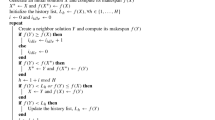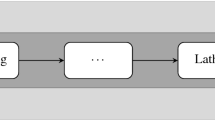Abstract
In this paper, we address a logistics problem that a manufacturer of auto parts in the north of Spain described to the authors. The manufacturer stores products in its warehouse until customers retrieve them. The customers and the manufacturer agree upon an order pickup frequency. The problem is to find the best pickup schedule, which consists of the days and times during the day that each customer is expected to retrieve his/her order. For a given planning horizon, the optimization problem is to minimize the labor requirements to load the vehicles that the customers use to pick up their orders. Heuristically, we approach this situation as a decision problem in two levels. At the first level, customers are assigned to a calendar, consisting of a set of days with the required frequency during the planning horizon. Then, for each day, the decision at the second level is to assign each customer to a time slot. The busiest time slot determines the labor requirement for a given day. Therefore, once customers have been assigned to particular days in the planning horizon, the second-level decision is a multiprocessor scheduling problem, where each time slot is the equivalent of a processor, and where the objective is to minimize the makespan. A metaheuristic procedure is developed for the problem of minimizing labor requirements in this periodic vehicle-loading problem and artificial as well as real data are used to assess its performance.
Similar content being viewed by others
References
B. Adenso-Diaz and M. Laguna, “Fine-tuning of algorithms using fractional experimental designs and local search,” to appear in Operations Research.
L. Babel, H. Kellerer, and V. Kotov, “The k-partitioning problem,” Mathematical Methods of Operations Research, vol. 47, no. 1, pp. 59–82, 1998.
J.L. Bentley, “Fast algorithms for geometric traveling salesman problems,” INFORMS Journal on Computing, vol. 4, pp. 387–411, 1992.
J. Blazewicz, “Selected topics in scheduling theory,” Annals of Discrete Mathematics, vol. 31, pp. 1–60, 1987.
V. Campos, F. Glover, M. Laguna, and R. Martí, “An experimental evaluation of a scatter search for the linear ordering problem,” Journal of Global Optimization, vol. 21, pp. 397–414, 2001.
E.G. Coffman, Jr., M.R. Garey, and D.S. Johnson, “An application of bin-packing to multiprocessor scheduling,” SIAM Journal on Computing, vol. 7, pp. 1–17, 1978.
N. Christofides and J.E. Beasley, “The period routing problem,” Networks, vol. 14, pp. 237–256, 1984.
M. Dell'amico and S. Martello, “Optimal scheduling of tasks on identical parallel processors,” ORSA Journal on Computing, vol. 7, pp. 181–200, 1995.
T.A. Feo and M.G.C. Resende, “A probabilistic heuristic for a computationally difficult set covering problem,” Operations Research Letters, vol. 8, pp. 67–71, 1989.
T.A. Feo and M.G.C. Resende, “Greedy randomized adaptive search procedures,” Journal of Global Optimization, vol. 2, pp 1–27, 1995.
G. Finn and E. Horowitz, “A linear time approximation algorithms for multiprocessor scheduling,” BIT, vol. 19, pp. 312–320, 1979.
P. França, M. Gendreau, G. Laporte, and F.M. Muller, “A composite heuristic for the identical parallel machine scheduling problem with minimum makespan objective,” Computers and Operations Research, vol. 21, no. 2, pp. 205–210, 1994.
S. Fujita and M. Yamashita, “Approximation algorithms for multiprocessor scheduling problem,” IEICE Trans. Information & Systems, vol. E83-D, no. 3, pp. 503–509, 2000.
R.L. Graham, “Bounds on multiprocessing timing anomalies,” SIAM Journal on Applied Mathematics, vol. 17, pp. 416–429, 1969.
F. Glover, “A template for scatter search and path relinking,” in Artificial Evolution, Lecture Notes in Computer Science, 1363, J.-K. Hao, E. Lutton, E. Ronald, M. Schoenauer and D. Snyers (Eds.), Springer, pp. 13–54, 1998.
F. Glover, M. Laguna, and R. Martí, “Fundamentals of scatter search and path relinking,” Control and Cybernetics, vol. 39, no. 3, pp. 653–684, 2000.
F. Harche and S. Seshadri, “An LPT-bound for a parallel multiprocessor scheduling problem,” Journal of Mathematical Analysis and Applications, vol. 196, no. 1, pp. 181–195, 1995.
R. Hübscher and F. Glover, “Applying tabu search with influential diversification to multiprocessor scheduling,' Computers and Operations Research, vol. 21, pp. 877–844, 1994.
M. Laguna, “Scatter search,” in Handbook of Applied Optimization, P.M. Pardalos and M.G.C. Resende (Eds.), Oxford University Press, New York, 2002, pp. 183–193.
M.A. Langston, “Improved 0/1 interchange scheduling,” BIT, vol. 22, pp. 282–290, 1982.
L.S. Pitsoulis and M.G.C. Resende, “Greedy randomized adaptive search procedures,” in Handbook of Applied Optimization, P.M. Pardalos and M.G.C. Resende (Eds.), Oxford University Press, New York, 2002, pp. 168–182.
S. Sahni, “Algorithms for scheduling independent tasks,” Journal of the Association for Computing Machinery, vol. 23, no. 1, pp. 116–127, 1976.
A. Thesen, “Design and evaluation of tabu search algorithms for multiprocessor scheduling,” Journal of Heuristics, vol. 4, pp. 141–160, 1998.
Author information
Authors and Affiliations
Corresponding author
Rights and permissions
About this article
Cite this article
Delgado, C., Laguna, M. & Pacheco, J. Minimizing Labor Requirements in a Periodic Vehicle Loading Problem. Comput Optim Applic 32, 299–320 (2005). https://doi.org/10.1007/s10589-005-4801-1
Received:
Revised:
Accepted:
Issue Date:
DOI: https://doi.org/10.1007/s10589-005-4801-1




